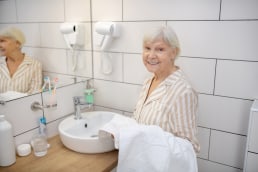The ultimate guide to personal care at home services

Looking for personal care services for a loved one? It can be a stressful process, so we've pulled together The Ultimate Guide to Personal Care at Home Services to help guide you through and answer key questions.
What are personal care services?
Personal Care and Support at home Personal care services help your loved one maintain their daily routine, and do so in ways that respect their privacy and dignity. Feeling fresh and clean can set them up for the day with a positive frame of mind. These services are delivered in the comfort of their own home, rather than having to go into residential care.
They shouldn't suffer any shame, but it can be challenging to discuss this topic. To help get the conversation started, here's a helpful list of specific support available.
Hair and personal hygiene
We include this at the top of our list for a reason.
Maintaining personal appearance and dignity is important for older people who may be struggling with everyday care. Everyone likes to feel clean, tidy, and at their best. Ensuring that your loved one feels fresh is important - it will help them. It will help them feel healthy and positive, both mentally and physically.
A fully trained carer will help style hair (or schedule a hair appointment), help them shave, apply makeup, and other hygiene essentials, to make them feel fresh and feel good.
Washing
It's common to need help to bathe, wash or shower when your loved one has reduced mobility. Slips and falls can be more common. It's harder to get in and out of the shower easily, and it can become difficult to wash thoroughly. This in turn can lead to reducing their confidence in being able to wash alone and therefore they're more likely to avoid doing it.
Personal care that assists in washing, showering or bathing will help them, have a helping hand and build back up their confidence. It may also include suggesting small changes to their bathroom set up to make things easier and safer for them.
Getting up and preparing for bed
Getting dressed and undressed can become a challenge as your loved one’s mobility reduces. Similarly, getting in and out of bed requires strength and mobility that might not be as easy as it used to be.
Again, it’s nothing to worry about. This is a normal part of aging. With help first thing in the morning and at bedtime, a carer will be there to assist your loved ones. Assisting with their morning and night-time routines, so you can be reassured they're getting around safely.
Foot hygiene
Corns and bunions appear frequently as we age. And keeping good circulation with regular activity can be a struggle so looking after your loved one's feet is essential.
You should encourage high quality foot treatment if they aren’t as mobile as they were. A personal caregiver can provide regular foot massages and other foot treatments, which are all part of their ongoing care plan.
Tooth care
We all know that regular tooth care is essential. Mouthwashes and brushing help reduce cavities and maintain healthy gums.
If your loved one requires help when brushing their teeth, a personal carer will help them. They will also help with scheduling regular dental visit.
Personal care services at home
Keeping up with a skin care routine
Your loved one's skin routine is really important to maintain. This can include applying lotion to their hands to keep them from cracking or applying medicated creams. A carer will provide this ongoing support to ensure they keep up their daily routine.
Toileting help
Toileting, like many of the areas we’ve covered so far, these items, can understandably be a sensitive subject. Your loved one may need help changing their catheter bag, changing continence pads or help using the toilet, commode or a bedpan.
If you think your loved one needs any of these services, don't hesitate to reach out. The carers are fully trained to deliver personal care that fully respects your loved one's privacy and dignity.
Medication assistance
Personal care services cover helping with medication and occasional medical intervention. If your loved one requires these services, then we'll be able to provide a highly trained caregiver to assist in their daily medical care.
How do you find the right caregiver?
We recommend using a care provider rather than employing an independent carer or personal assistant.
If you employ a paid carer directly yourself, you have the legal responsibility of an employer. This includes arranging cover for their illness and holidays, dealing with disciplinary issues, no added protection of staff training, and vetting plus care in this way isn't monitored by CQC - the UK's care regulators.
By using a home care provider, all these potential issues are eliminated, and you have the reassurance that everything is being dealt with for you and your loved one with their best interests at the heart.
Latest Care Provider & Regulatory News
 25-Apr-25
Welcome to our homecare team
25-Apr-25
Welcome to our homecare team
 24-Apr-25
Lymm Duck Race
24-Apr-25
Lymm Duck Race
 24-Apr-25
… Digital Health Monitoring is here ….
24-Apr-25
… Digital Health Monitoring is here ….
 24-Apr-25
Belong Atherton Recognised with Top Nursing Accolade
24-Apr-25
Belong Atherton Recognised with Top Nursing Accolade
 24-Apr-25
Staying Connected
24-Apr-25
Staying Connected